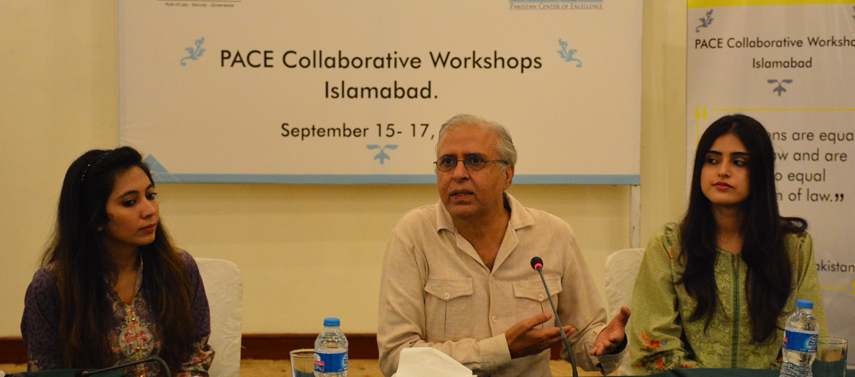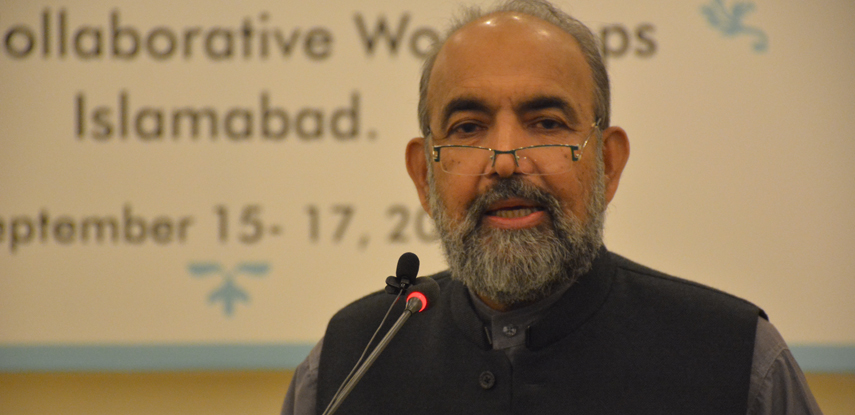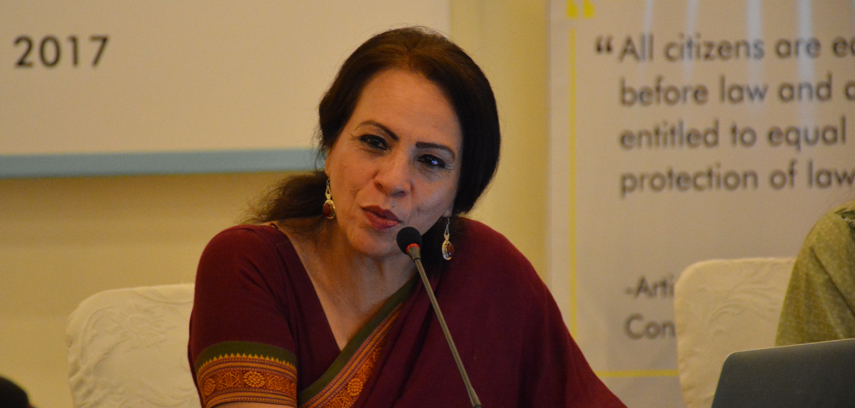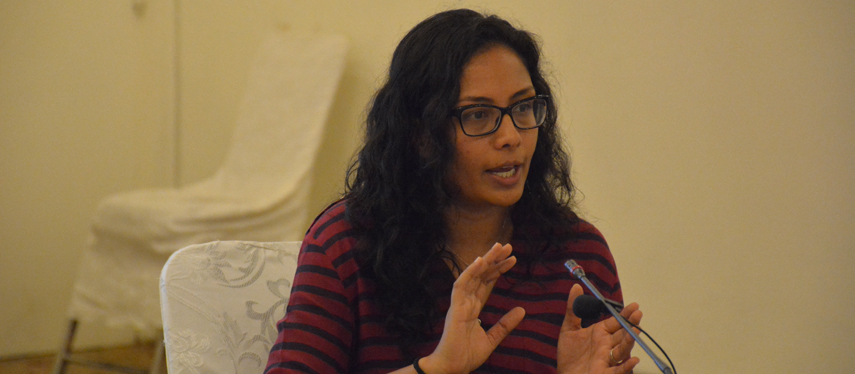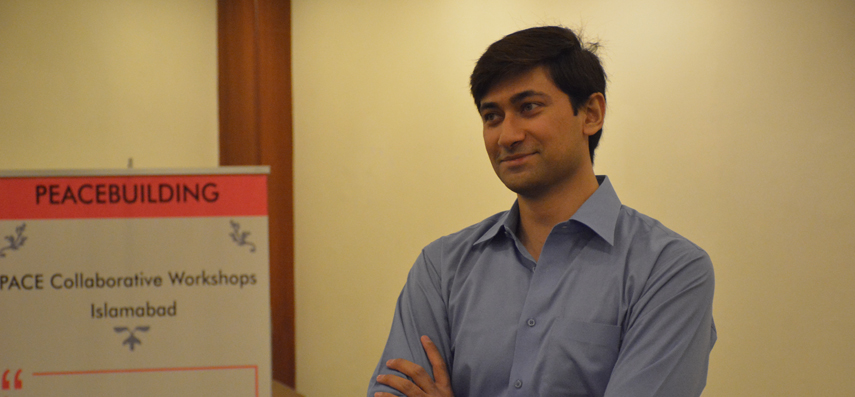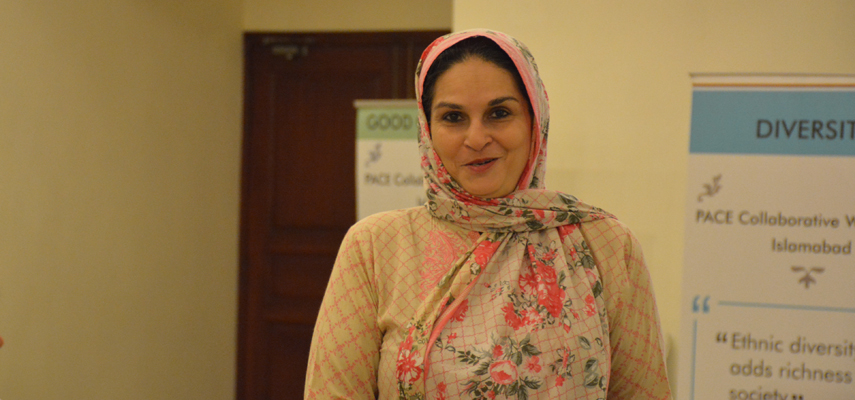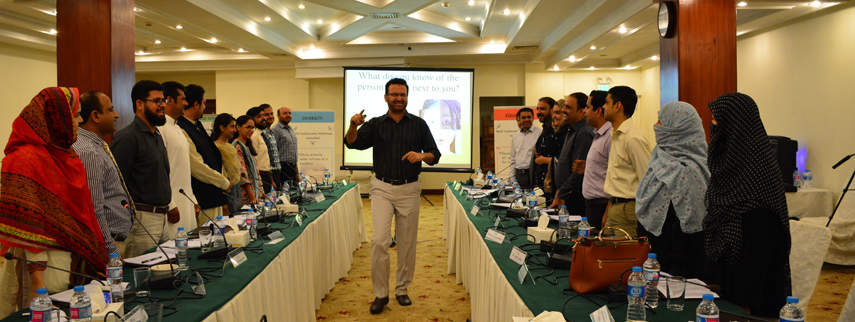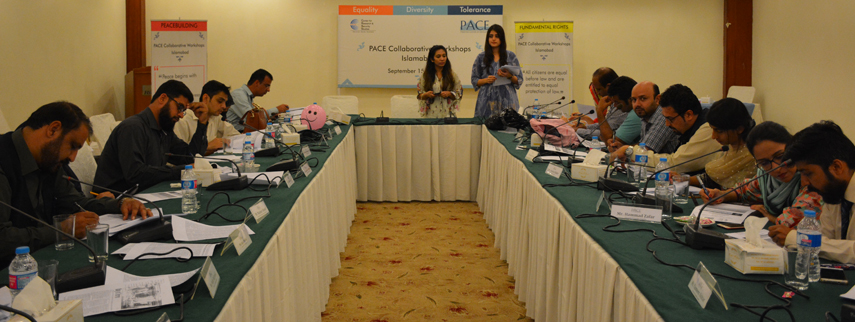The Center for Research and Security Studies (CRSS) conducted the 21st three-day PACE Collaborative workshop for young university lecturers and professors from September 15 – 17, 2017, at Hill View Hotel, Islamabad. The workshop was conducted under the umbrella of the Pakistan Center of Excellence (PACE), a counter-radicalization, pluralistic values focused project, in collaboration with the Dutch Government. Participants included young university lecturers and professors from University of Sargodha; Sargodha, University of Sindh; Jamshoro, Karakoram International University; Gilgit Baltistan, Mehran University of Engineering and Technology; Jamshoro, University of Balochistan; Quetta, Institute of Educational and Professional Development; Muzaffarabad, AJK, and Preston University; Islamabad
OPENING
AMBASSADOR MR. MIAN SANA ULLAH
His Excellency, Ambassador Mr. Mian Sanaullah, was chief guest to the opening ceremony. He shared his thoughts saying that equality or diversity always has been a part of the constitutions in every state of the world. He said, “I don’t think so that any of the state can keep itself away from guaranteeing the basic human rights. If any state does so, they are most probably violating the UN Declaration of Human Rights. They would certainly be facing punishment in the shape of sanctions.” Referring to the Burma situation, he shared, “I was going through their constitution and I am surprised to see that they also have provided for a number of religions as state religion. It’s not just Buddhism that rules in Burma, but what we see now is brutal genocide of Ruhingya that is murdering diversity.”
Sharing his experience of Indonesia and Malaysia, he said that they are the most diverse nations in the world. You can see a few exceptions as of violation of basic human rights but practically and constitutionally they are trying to ensure that everyone is entitled to the basic rights. In Indonesia, there are five official religions that promote diversity and inter-faith harmony. But we here, in Pakistan, disown everything that existed before the arrival of Islam and this is the clear manifestation of intolerance.
Culture, sometimes, tries to dominate. Lebanon is also one of the examples by giving away the high offices to the people belonging to different religions or sects. Bosnia has also tried to ensure or promote diversity by including the minority groups in the state affairs by their representatives. Belgium also has specified the number of seats to every community in the country. India’s constitution also promotes equality and diversity. But this is one of the challenges that despite all these ideal situations, you see minority groups suffering from persecution in these states too.
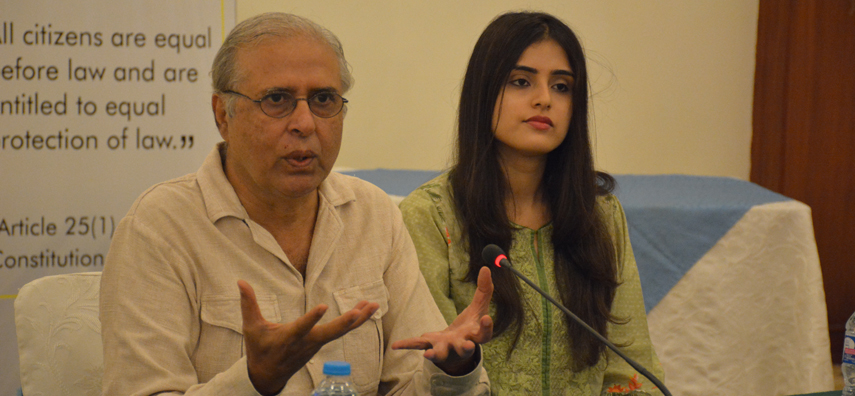
Minorities that suffer from persecution survive in a state of beseeched mentality and its effects continue to the generations. Every society has racism, sexism and all other discriminatory behaviors but the question is that how can we come out of it? “First of all what I would suggest is that states should not get involved in the personal affairs of the citizens by not making laws that promote hate speech and structural violence. There should not be discrimination on the basis of religion, sect, sex, race or language. Institutions are not strong enough to protect the people’s rights,” he said.
He continued saying, “I am not worried because there are no equal rights for all, but what makes me concerned is that we have become intolerant to the level where we just want ourselves to be considered and acknowledged as righteous and supreme. We need to take the responsibility of correcting ourselves and then moving on to the positive societal behavioral change. Your strength is in differences that can only be promoted by respecting and accepting diversity.”
QIBLA AYAZ: FUNDAMENTAL OF DEMOCRACY, GOVERNANCE AND ACCOUNTABILITY
Dr. Qibla Ayaz kicked off the workshop’s first session on the first day and discussed the topic of ‘Fundamentals of Democracy, Governance and Accountability’. He stimulated the discussion relating it to the current socio-political situation of the Pakistan in wake of Panama Leaks, NAB, and accountability commissions. He also compared and contrasted the new form of electoral democracy that has taken birth in USA, entirely different from that of eight years back election when Obama was elected. Now USA is more focused on localization by restricting the domestic politics to white people.He took the participants back into the history of democracy that has evolved through different stages. Citizens have experienced different forms of governments in the past such as aristocracy, dictatorship, and dictatorship of the religion. Islamic history has also gone through the same phases; such as dynastic rule by a few families. Across these historical phases, democracy has emerged as the best state system. Among other forms of democracy are parliamentary and presidential systems. Fostering discussion around aspects of democracy i.e. outward and inward appearances, he said that the outward appearance is the structural election process whereas inward appearance deals with the accountability of the representatives of the people. The inward appearance is the spirit of the democracy. Accountability is a prerequisite for democratic systems. Talking about lack of sustainability of democracy in Pakistan, he said that democracy has not failed in Pakistan but it has always been portrayed as a failed system. Democracy stabilizes with able leadership and this is what we lack in Pakistan. Good governance can emerge only if democracy is mature and stable. Good governance is based on social justice, rule of law, and provision of fundamental human rights.
FARZANA BARI: EQUAL CITIZENRY AND RULE OF LAW
Dr. Farzana Bari kicked off her session by saying that we need to create the concepts of rule of law and equal citizenry before we understand them. “There is an inherent concept of embedded citizenry that I would like to unpack together; we all are considered as equal citizens despite the facts of being diverse is there based on religion, gender, class, ethnicity or language. Every citizen is supposed to be considered equal before law. There are many dimension to the equal citizenry, one of them is to provide civic, political and social rights to all. Language of citizenship accepts as a given that citizenship meant for “independent” self-supporting individuals,” she said.
She elaborated the topic with saying that the laws govern societies; four fundamental principles of society are accountability, just laws for all, open government and accessible and impartial dispute resolution for all. We cannot assume that every citizen is equal because we see structural problems in the context of Pakistan. If you go for the historical analysis of the citizenship, we see that there is struggle in the history for the adoption of this concept. With the concept of property, the concept of state also emerged. There are people who own property and there are people who don’t. There was this fear that the people who are dispossessed who can snatch away the propertied class’s property. So to protect the propertied class’s interests, state came into emergence.
Our political theorists used to think in a gendered way; their concept was that the women are irrational and mentally and physically not able to possess politics. First social contract of the state is essentially with the men and with the men who are propertied class of men. The concept of patriarchy was already established with the emergence of the concept of the state. There was this notion of women as private citizens and sexual contract embedded in social contract.
After a long struggle, women rights started getting protected by legislating laws for them. Women were given the right to vote after WWII. People have struggled a long way for equal citizenship. If we look in the context of Pakistan, we see that there is no equal citizenry. If we look critically, our laws don’t give equal rights to the religious minorities, women, transgenders, and other marginalized groups. We can see there is exclusion of all these marginalized groups and state institutes are not likely to be seen interested in ensuring or assuring equal rights for all. Governance structures need to be transformed as more inclusive and participatory (without the voice and representation of all interests groups in governance , rule of law will remain elusive).
RADHA SHAH: ADRESSING AND RECOGNIZNG SEXISM: GLOBAL AND PAKISTANI CONTEXT
Ms. Radha Shah started her session on “Addressing and Recognizing Sexism in Global and Pakistani Context.” She shared her experience saying that the session would specifically focus on the issue of sexism at the workplace when women are harassed sexually as well as don’t have equal access to speak or participate. Sexism even when you are not being heard on the basis of your gender and how can it affect your possibility for contribution and function in a professional capacity. It also means that if women are facing particular barriers at the workplace they are also excluded from the broader ideas of diversity. A lot of organizations in Pakistan and around the world make talks in terms of inclusivity and diversity. But what actually happens is that women are in a constant marathon to keep up with their male colleagues.
We need to look into the practical solutions for women where experience is more bearable and also productive. At the same time what are the things that men can do to actively create more equality for women at workplace if they are very much into this idea of diversity and equality.
She said, “My experience is from Canada and now in Pakistan, where I faced sexism that was also combined with racism. A colored person’s experience is way different from a white person facing sexism. One major difference that I noticed prior to coming to Pakistan that I never talked about sexism and feminism as much as I had here and it wasn’t expected. I found from my conversations with my social circle and professionals that women have to fight through every day and women are also tired of experiencing discrimination at work place. We need to encourage discussion on gender equality and more on women inclusion in mainstream.”
A woman, in Pakistan, is supposed be careful while making decisions for herself. Women can’t wear dresses of their choice, their participation and contribution at work place is not as appreciated as those of men, they are thought of lacking inter-personal skills, their capability and credibility is being misjudged on the basis of their gender. A women’s experience has very much to do with their gender.
Laws like Anti-Harassment Act, 2010 was passed and such laws are starting a point for change. Despite the fact, we have a law, still there are lots of gaps and women face harassment. At the organizational level, HR and admin departments should make sexual harassment laws and protect women from assault or other discriminatory or abusive behaviors. People need to be educated about equal rights for all and also need to bring such issues in the notice of policy makers to get away with these crucial issues.
MUSTAFA MALICK: MOTIVATION AND ROLE OF THE TEACHERS AS GATE KEEPERS
Mr. Mustafa Malik also spoke of motivation and compared the close relation between rights and responsibilities to motivation and demotivation, as they cannot be separated. He insisted that failure only means you are closer to success as long as you learn from it and stay motivated. “The only thing stopping you from achieving something is yourself,” he concluded.
HUMAIRA MASIHUDDIN: MULTI-CULTURALISM AND PLURALISM WITH REFERENCE TO ISLAM
Ms. Humaira Masihuddin kicked off the first formal session of the third day speaking on the theme of ‘Pluralism and Multiculturalism’. She said that human beings belong to one origin and one place, and no purely homogeneous society exists in the modern world. Most societies consist of different ethnic groups. She defined minorities as a group of people who are singled out from the other groups and are treated differently because of their physical or cultural characteristics. “Minority is a subordinate group as opposed to the dominant group. The concept of multiculturalism revolves around a society with heterogeneous beliefs and set of ideas. Multiculturalism makes a society diverse. Respect for diversity shapes coexistence, peace, and harmony under a political and institutional framework. Differences are not challenges and do not impose any limitation on the growth of an individual or society. Every individual has a right to be different and be respected by all. In Islam, the concept of diversity is clearly inclusive,” she continued. In the Quran, she said, “Humans are addressed to treat one another without any discrimination and respect each other’s beliefs and should never use abusive language or show disrespect towards others. If we look at the character of the Holy Prophet (PBUH), it is evident how He always respected the non-Muslims in Mekkah and Medina. Even on the day Mekkah was conquered by Muslims, Prophet (PBUH) forgave all His enemies for the harms that they had inflicted on Him.” Ms. Humaira also made note of the last sermon of the Holy Prophet that said “All mankind is from Adam and Eve, an Arab has no superiority over a non-Arab nor a non-Arab has any superiority over an Arab; also a white has no superiority over black nor a black has any superiority over white except by piety (taqwa) and good action”. In short, Islam is the religion of tolerance and coexistence, love and peace for others regardless of their religion or ethnicity.
SAFIULLAH GUL: MOTIVATION AND LEADERSHIP
Mr. Safiullah Gul was the last speaker of the workshop and spoke on the topic of ‘Leadership and Motivation’. He began with the saying that “he who fails to plan actually plans to fail” and shared stories of people who alone have changed the course of history, with motivation and persistence, despite all the opposition.
He said that successful leadership determines the extent of efforts directed towards a certain goal. He presented his model of goal-seeking i.e. activation, persistence and intensity. “Being alone doesn’t actually matter if you have goals and objectives set in your mind. To achieve these goals, you actually need to overcome your fears and insecurities. An individual sometimes can set an example and be motivation for others,” he shared.
The session, filled with activities to enhance creative and critical thinking, focused on looking at things from a slightly different perspective to encourage problem-solving.
CLOSING
Ms. Farhana Kanwal, Project Coordinator, PACE, in her concluding remarks, insisted that there is a dire need to revisit the widespread pre-conceived notions that have been passed through cultural values in the society over generations. Teachers, with the responsibility of imparting values to the young generation in educational institutions, are the most valuable engines that can challenge common negative narratives that promote hatred and bigotry. She said that teachers have the ability to shape an entire generation’s mindset to propagate tolerance, diversity and equality.
She shared that participants need to conduct these activities with their students to inculcate adherence to the rule of law and equal citizenry. CRSS provides financial and logistic support in this regard to lecturers and professors so that they can foster the universal ideals of tolerance and diversity in the young generations.

